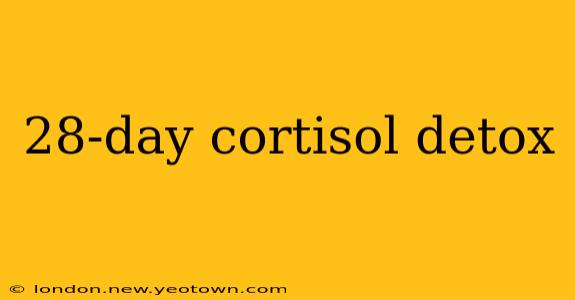The relentless pace of modern life often leaves us feeling stressed, overwhelmed, and perpetually exhausted. This constant state of "fight or flight" can wreak havoc on our bodies, primarily by elevating cortisol levels, the hormone responsible for our stress response. A prolonged period of high cortisol can lead to a cascade of health problems, from weight gain and insomnia to impaired immunity and mood disorders. This is where a 28-day cortisol detox comes in – a holistic approach to regaining balance and reclaiming your wellbeing. It's not about a quick fix, but rather a journey of mindful changes to support your body’s natural cortisol regulation.
This isn't a restrictive diet or a grueling exercise regimen; it's a lifestyle reset. We'll explore practical strategies to lower cortisol naturally, fostering a sense of calm and rejuvenation. Think of it as a roadmap to a healthier, more balanced you.
What is Cortisol and Why Does it Matter?
Cortisol, often called the "stress hormone," is vital for regulating numerous bodily functions, including blood sugar, metabolism, and immune response. However, chronically elevated cortisol levels, due to prolonged stress, disrupt this delicate balance. Imagine your body's thermostat stuck on high – eventually, things start to break down.
This prolonged stress response can manifest in various ways, depending on individual factors. Some may experience weight gain, specifically around the abdomen. Others might struggle with insomnia, waking up frequently during the night. Many find themselves battling low energy, brain fog, and a weakened immune system. Understanding the role of cortisol is crucial to understanding the need for a detox.
How Does a 28-Day Cortisol Detox Work?
A 28-day cortisol detox isn't about eliminating cortisol entirely – that's impossible and undesirable. Instead, it's about implementing lifestyle changes that support your body's natural cortisol regulation mechanisms. This involves addressing the root causes of chronic stress and promoting relaxation and recovery.
The foundation of this detox lies in a multi-pronged approach:
-
Prioritizing Sleep: Aim for 7-9 hours of quality sleep each night. Establish a regular sleep schedule, create a relaxing bedtime routine, and optimize your sleep environment for darkness and quiet. Sleep deprivation significantly impacts cortisol regulation.
-
Mindful Nutrition: Focus on nutrient-rich whole foods, minimizing processed foods, refined sugars, and excessive caffeine. Incorporate foods known for their stress-reducing properties, such as leafy greens, berries, and fatty fish. Good nutrition supports adrenal health, crucial for cortisol production.
-
Stress Management Techniques: Incorporate stress-reducing practices into your daily routine. This could include yoga, meditation, deep breathing exercises, or spending time in nature. Finding healthy outlets for stress is key to lowering cortisol levels.
-
Regular Exercise: Engaging in regular physical activity, particularly low-impact exercises like walking or yoga, can help manage stress and improve overall wellbeing. Avoid intense workouts close to bedtime, as they can interfere with sleep.
-
Social Connection: Nurture your social connections. Strong social support networks provide emotional resilience and help buffer against stress.
What are the Benefits of a Cortisol Detox?
The benefits of a 28-day cortisol detox extend far beyond simply lowering cortisol levels. By addressing the underlying causes of chronic stress and implementing healthy lifestyle changes, you can experience:
- Improved Sleep Quality: Better sleep regulation translates to more energy and improved cognitive function.
- Weight Management: Reducing stress and improving diet can support healthy weight management.
- Enhanced Mood: Lower cortisol levels contribute to improved mood and reduced anxiety.
- Boosted Immunity: A stronger immune system means less susceptibility to illness.
- Increased Energy Levels: Improved sleep and reduced stress contribute to increased energy throughout the day.
- Sharper Cognitive Function: Reduced stress improves focus, concentration, and memory.
What are Some Common Mistakes to Avoid During a Cortisol Detox?
- Expecting Overnight Results: Change takes time. Be patient and consistent with your efforts.
- Going Too Extreme: Avoid overly restrictive diets or intense exercise programs that can increase stress.
- Neglecting Stress Management: Addressing stress is crucial for long-term success.
- Ignoring Sleep: Prioritize sleep as a cornerstone of your detox.
Can a Cortisol Detox Help with Weight Loss?
Yes, a cortisol detox can indirectly support weight loss. Chronic stress and elevated cortisol levels can lead to increased abdominal fat storage. By reducing stress and improving diet and sleep, a cortisol detox can contribute to a healthier body composition.
What Foods Should I Eat During a Cortisol Detox?
Focus on whole, unprocessed foods such as fruits, vegetables, lean proteins, and whole grains. Incorporate foods rich in magnesium, vitamin C, and B vitamins, as these nutrients support adrenal function.
What Supplements Can Support a Cortisol Detox?
Consult with a healthcare professional before taking any supplements. Some commonly suggested supplements include magnesium, vitamin C, and adaptogens like ashwagandha, but their use should be discussed with a medical professional. They can help assess your individual needs and determine if supplementation is appropriate.
Embarking on a 28-day cortisol detox is a commitment to yourself and your wellbeing. It's a journey of self-discovery, learning to listen to your body, and making sustainable changes that will benefit you for years to come. Remember, consistency is key. Small, consistent changes over time will yield the most significant results. This journey is about creating a healthier relationship with your body and mind, one day at a time.

